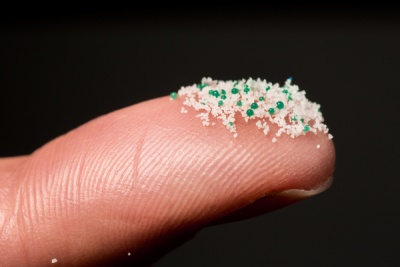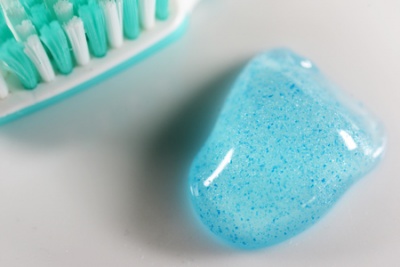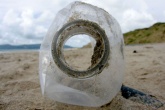Cosmetics producers ‘all over the shop’ in phasing out polluting plastic microbeads

Microbeads, tiny pieces of plastic that are so small that they pass through water filtration systems and can enter waterways and the sea unimpeded, are commonly used in household products like cosmetics, toothpastes, shaving gels and detergents, acting as exfoliants or sometimes simply as decoration.
Though their effect on marine life, and subsequently humans that ingest polluted fish, is not yet certain, research has shown that a high proportion of fish and other sea life has ingested the fragments of plastic, with one study from Plymouth University finding microplastic in 36.5 per cent of fish analysed from the English Channel. A study by researchers in Sweden has also concluded that fish that are exposed to microplastics as larvae prefer to eat plastic rather than their natural prey, an impact that could have ‘profound’ effects on aquatic ecosystems. The amount of plastics entering the marine ecosystem through cosmetics is vast, with Eunomia Research and Consulting estimating that 950,000 tonnes of microplastics enter the ocean every year, of which 35,000 comes from cosmetic products.
To date, action against the use of the polluting pieces of plastics has mostly been voluntary, with some manufacturers, like Colgate-Palmolive, removing microbeads from their products and others like Marks & Spencer and Boots promising to end production by the end of 2016. L'Oréal, Johnson & Johnson and Reckitt Benckiser have all said they will stop using microbeads by 2017.
Producers ‘all over the shop’
However, a new report, carried out by Greenpeace East Asia, says that some companies are ‘virtually ignoring’ the issue, while others are only taking limited action.
The report, ‘Global Cosmetics and Personal Care companies’ Microbead commitment ranking’, surveyed ‘the world’s 30 largest personal care companies’ and ranked their actions against microbeads.
Despite a range of scores, none of the companies are doing enough to combat the issue, according to Louise Edge, Senior Oceans Campaigner at Greenpeace UK: “When it comes to dealing with microbeads, companies are all over the shop. These are the world’s biggest cosmetics and personal care companies, and not one of them has an acceptable plan to stop the use of microbeads.”
The report’s rankings are based on four criteria:
- Commitment and information transparency – whether the company has given a commitment to not using microbeads that is publicly available and easy to access.
 Microplastics among plankton© Greenpeace / Gavin Parsons
Microplastics among plankton© Greenpeace / Gavin Parsons - Definition of microbeads – does the company provide a suitable and all-encompassing definition of microbeads?
- Deadline – when will the company fulfil its commitment?
- Application scope – does the commitment cover all products sold in all markets across the world?
Each criteria is assessed out of 100 and is weighted equally, giving a maximum score of 400. The higher the score, the better.
Loopholes and sloppy definitions
Those companies that scored highly, such as the American Colgate-Palmolive (producers of Palmolive, Sanex, Colgate) and German company Henkel; (Persil, Schwarzkopf), were found to have recognised that the use of microbeads is a serious environmental issue and have pledged to phase out their use. However, Greenpeace states that not a single company has a commitment ‘that covers all types of plastic across all of their products’ and concludes that ‘all of these companies will be pouring plastic into our oceans for the foreseeable future’.
The highest scoring companies were Beiersdorf, L Brands and the two mentioned above, who all scored 340 out of a possible 400 points. While all of the highest ranking countries gave a commitment with global scope on their website and provided a deadline for meeting their commitments, the report noted that there were possible loopholes in their definition of microbeads that prevented them from achieving maximum points.
Providing an unsuitable definition of microbeads was a downfall of all the surveyed companies. They were criticised for not accounting for all types of plastics (focusing on polyethene), not covering all possible functions of microbeads (focusing on exfoliation and cleansing), and not stating the full range of products in which microbeads can be found (focusing largely on rinse off products). It found that the definitions of some companies also did not provide suitable measurements for the size of microbeads.

Lower ranking companies were penalised for not making their commitments publicly available, restricting the definition of microbeads to plastic ‘spheres’ (Botica Comercial Farmacêutica) or ‘small plastic balls’ (Revlon) for example, or for not providing great enough transparency to their customers with regards to their commitments.
Governmental action
Responding to the results, Edge added: “It’s clear there needs to be political action now to ban microbeads outright.”
Governments are indeed beginning to take action. At the end of 2015, it was announced that the United States would be banning the use of microbeads from January 2018, with a phase out beginning in July 2017.
Meanwhile, the UK parliament’s Environmental Audit Committee has been investigating the issue, with a report due out after the summer recess in the week commencing 22 August.
At one of the evidence sessions for the committee’s inquiry, carried out before the EU referendum, MP George Eustice, Minister at the Department for Environment, Food & Rural Affairs (Defra) said that the government would support a ban, but would prefer action to be taken at a European level. A national ban, he said, would only stop manufacturers from making products containing microbeads, rather than the sale of products produced overseas.
Though he said that the government would be prepared to put a ban in place if European action failed to progress, it remains to be seen if the UK’s decision to leave the EU will delay any action on microbeads.
The minister also defended the progress made by voluntary commitments, saying that “most of the cosmetic companies have signed up to say that they do want to phase these things out anyway”, but added: “Once you get to that point, quite often the easiest thing to do is to simply put a ban in place, so that if there are any remaining companies that are refusing to sign up to the ban, they’re caught by it.”
The full Greenpeace report ranking companies’ action against microbeads can be downloaded from the Greenpeace website.










